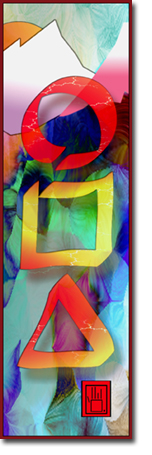On The Way: The Daily Zen Journal
Concentration and Wisdom are One Essence
Sheng Yen (1930-2009)
To practice Chan, we begin with an afflicted mind and learn to discipline it. We then concentrate the mind to unify it, and eventually, we perceive the true nature of mind and realize enlightenment, which is the essence of Chan.
Discipline corresponds to the spirit of the Buddhist precepts that guide personal behavior. It also corresponds to the habits of normal daily living—maintaining an orderly, tranquil, and harmonious environment.
Concentration means using methods of Chan to rein in and pacify the mind. The Platform Sutra of Huineng says that samadhi itself is prajna. This means that wisdom and concentration are not separate things. Apart from the mind, there is no samadhi and no prajna.
The third and paramount principle of Buddhist practice is wisdom. Wisdom is the direct experience of phenomena as precisely emptiness—the realization that self and all objects of the mind are empty and that emptiness is not separate from form. This understanding arises from a state free of afflictions and deluding thoughts.
Worldly methods of concentration do not free us from afflictions, and worldly wisdom does not lead to liberation. Only the union of samadhi and prajna in Chan or Buddhist wisdom, with its power to reveal our true nature, can bring release and liberation. Release and liberation are two aspects of one essence. Thus, samadhi and prajna accord with each other. They are different yet one and the same, neither two nor  one.
one.
Wisdom means clearly understanding all compounded things are impermanent and realizing that all things have no independent self. When you practice Chan, you contemplate the body and its actions, and you see that they are impermanent; you observe thoughts coming and going, and you see that they are impermanent. You know they have no fixed existence, no self, and thus you witness their empty nature. This is engendering wisdom through contemplation. Therefore, selfless wisdom is the great concentration that comes from being free from affliction.
Concentration in Chan is not a state where there are no thoughts in the mind—the mind is not just blank. In Chan, we avoid dwelling on forms, and we merge with the suchness of everything, which is called buddha-nature (tathagata-garbha). The ordinary mind attaches to phenomena, and thoughts are stirred up by the forms that follow. The enlightened mind is neither moved by phenomena nor stirred by forms; it functions freely but abides nowhere. Not stuck at the level of discrimination and affliction—this is the pure mind of wisdom, responding to the myriad things and giving each its due.
Sudden enlightenment may be abrupt, but it is not easy to attain. It is terribly naive to believe it can happen without genuine cultivation. Without the methods of Chan guided by practical wisdom, one will practice blindly or be misled by wayward ideas.
In Buddhism, there is worldly knowledge and transcendent knowledge. There is also the boundless wisdom (samyak sambhodi) of the buddhas of the highest attainment. This is the stainless, formless wisdom of the buddhas. Chan practitioners on the Path rely on this supreme source and the guidance of ancestral Chan masters. We take the worlds of the buddhas and Chan masters as our guide on the Path and as a mirror of our own minds. We feel secure in relying on these methods. With them, we investigate our true nature and resolve the great questions of impermanence, the nature of mind, and enlightenment.
Sheng Yen (1930-2009)
Excerpted from Attaining the Way: A Guide to the Practice of Chan Buddhism-Sheng Yen 2006





The beauty of Buddhism is that no matter where we are in our understanding, we are given a way to proceed. We are also given instructions that depend on our own efforts, not someone else’s. With most of us not living in monasteries, we face the task of bringing these principles alive in our daily lives. There is no outer structure, no one providing a schedule of when to meditate; there are no daily talks we get to listen to, so where does this guidance and structure come from?
Master Sheng Yen’s discourse essentializes the beginning steps of practice and the ultimate goal, providing a kind of yardstick we all can use. Discipline is a strong word to use in modern times. While it is structured in monastic life, practicing in the world demands a kind of self-starting mindset to create “an orderly, tranquil, and harmonious environment” that will foster a life of practice. These beginning steps of practice may be something we return to our entire lives.
It has always been more difficult to train on one’s own. It requires a kind of strength of commitment and courage to keep going when there is no teacher or encouraging influence to cheer us on. So, we begin fresh each day to craft this work of art, which is our life practice. Respecting each of our vasanas, or tendencies, we sculpt a life of training. It is truly a work in progress, sometimes requiring us to add more to this area; sometimes, we need to trim back in others. No one is over us mandating when we meditate or how we respond to each situation that comes up.
The first order of business is bringing the wayward mind back to rest; hence, the practice of meditation provides a solid foundation in this skill. However, if we don’t bring the discipline of daily practice to this goal, we flounder around and don’t really acquire any skill. The key seems to be finding a way to set this time aside; even if it can only be 10 minutes, it is still worth the effort. As our practice matures, we find other times and ways to meditate. That’s where the creativity of each person’s practice blooms.
Keep the fire of your aspirations bright; find reminders in everyday actions; create an environment which is tranquil in the midst of distractions. The art of practice brings out each person’s creativity, engaging them to participate in the mind that seeks the Way. To study the Way is to study the self.
To study the self is to forget the self.
To forget the self is to be enlightened by all things.
To be enlightened by all things is to remove the
Barriers between one’s self and others.
Dogen
May your Way be clear,
Elana, Scribe for Daily Zen